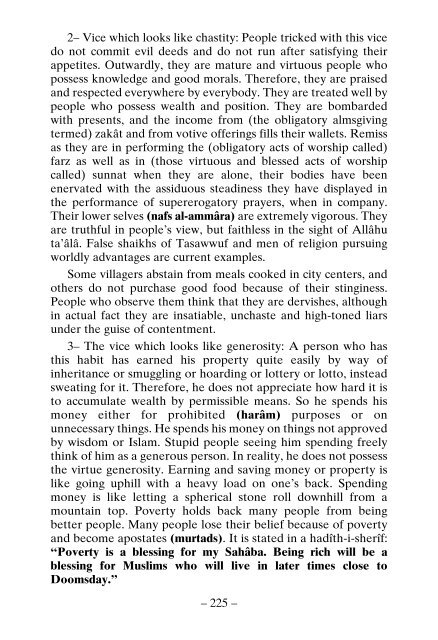Ethics of Islam
Ethics of Islam is taken from the book Berîka by Muhammad Hâdimi. Immorality and ways to get rid of it; 40 depravities and cures to them; usefulness of ethics; what is a soul; strengths of a soul; Personalities emanating from wisdom, courage, chastity and justice are extensively explained.
Ethics of Islam is taken from the book Berîka by Muhammad Hâdimi. Immorality and ways to get rid of it; 40 depravities and cures to them; usefulness of ethics; what is a soul; strengths of a soul; Personalities emanating from wisdom, courage, chastity and justice are extensively explained.
You also want an ePaper? Increase the reach of your titles
YUMPU automatically turns print PDFs into web optimized ePapers that Google loves.
2– Vice which looks like chastity: People tricked with this vice<br />
do not commit evil deeds and do not run after satisfying their<br />
appetites. Outwardly, they are mature and virtuous people who<br />
possess knowledge and good morals. Therefore, they are praised<br />
and respected everywhere by everybody. They are treated well by<br />
people who possess wealth and position. They are bombarded<br />
with presents, and the income from (the obligatory almsgiving<br />
termed) zakât and from votive <strong>of</strong>ferings fills their wallets. Remiss<br />
as they are in performing the (obligatory acts <strong>of</strong> worship called)<br />
farz as well as in (those virtuous and blessed acts <strong>of</strong> worship<br />
called) sunnat when they are alone, their bodies have been<br />
enervated with the assiduous steadiness they have displayed in<br />
the performance <strong>of</strong> supererogatory prayers, when in company.<br />
Their lower selves (nafs al-ammâra) are extremely vigorous. They<br />
are truthful in people’s view, but faithless in the sight <strong>of</strong> Allâhu<br />
ta’âlâ. False shaikhs <strong>of</strong> Tasawwuf and men <strong>of</strong> religion pursuing<br />
worldly advantages are current examples.<br />
Some villagers abstain from meals cooked in city centers, and<br />
others do not purchase good food because <strong>of</strong> their stinginess.<br />
People who observe them think that they are dervishes, although<br />
in actual fact they are insatiable, unchaste and high-toned liars<br />
under the guise <strong>of</strong> contentment.<br />
3– The vice which looks like generosity: A person who has<br />
this habit has earned his property quite easily by way <strong>of</strong><br />
inheritance or smuggling or hoarding or lottery or lotto, instead<br />
sweating for it. Therefore, he does not appreciate how hard it is<br />
to accumulate wealth by permissible means. So he spends his<br />
money either for prohibited (harâm) purposes or on<br />
unnecessary things. He spends his money on things not approved<br />
by wisdom or <strong>Islam</strong>. Stupid people seeing him spending freely<br />
think <strong>of</strong> him as a generous person. In reality, he does not possess<br />
the virtue generosity. Earning and saving money or property is<br />
like going uphill with a heavy load on one’s back. Spending<br />
money is like letting a spherical stone roll downhill from a<br />
mountain top. Poverty holds back many people from being<br />
better people. Many people lose their belief because <strong>of</strong> poverty<br />
and become apostates (murtads). It is stated in a hadîth-i-sherîf:<br />
“Poverty is a blessing for my Sahâba. Being rich will be a<br />
blessing for Muslims who will live in later times close to<br />
Doomsday.”<br />
– 225 –

















